Leadership and Responsibility: Critical Analysis of Dean's Disease
VerifiedAdded on 2023/01/11
|7
|1477
|51
Report
AI Summary
This report provides a critical analysis of Arthur G. Bedeian's article, 'The Dean's Disease: How the Darker Side of Power Manifests Itself in the Office of the Dean.' The report summarizes the article, which discusses the negative consequences of unchecked power, particularly within university settings, focusing on the behaviors of deans. It highlights key ideas such as the concept of 'dean's disease,' the author's originality, and the use of psychological research and literary references. The analysis evaluates the evidence presented, noting the age of some sources, and assesses the consistency and logic of the arguments. The report also addresses potential biases, emphasizing the author's observations and the article's implications for leadership and power dynamics in higher education. The report concludes with an overall assessment of the article's strengths and limitations, offering insights into leadership and responsibility.
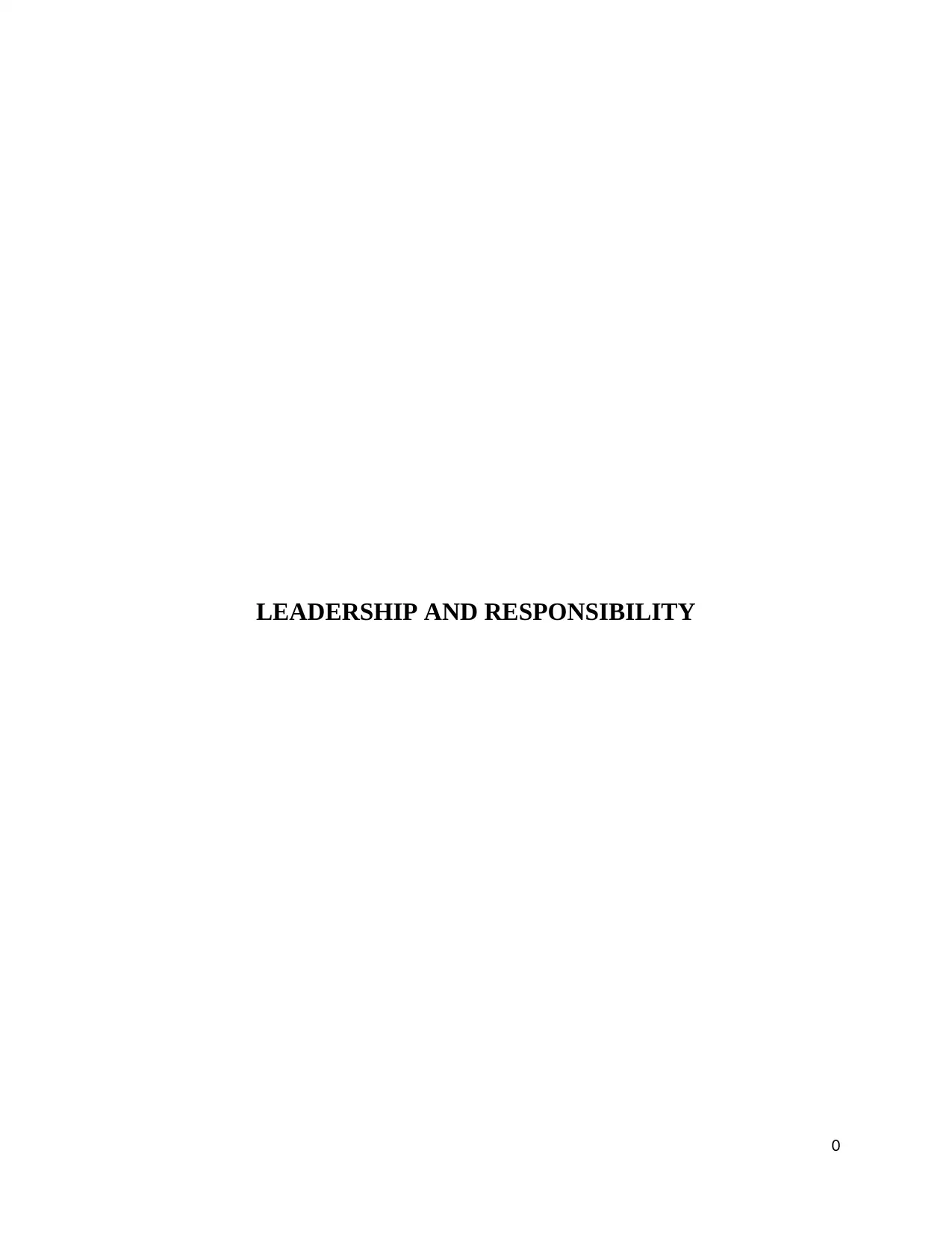
LEADERSHIP AND RESPONSIBILITY
0
0
Paraphrase This Document
Need a fresh take? Get an instant paraphrase of this document with our AI Paraphraser
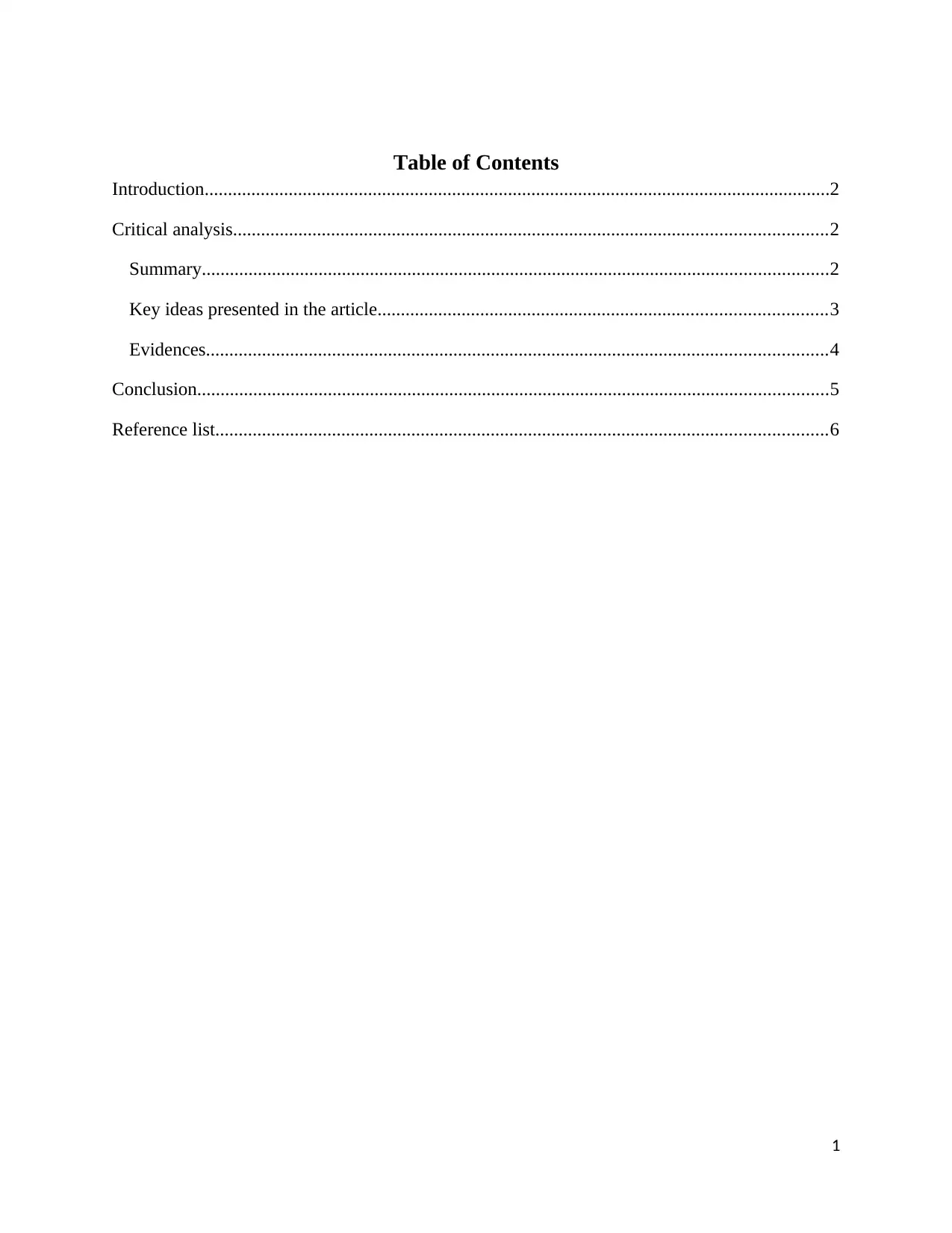
Table of Contents
Introduction......................................................................................................................................2
Critical analysis...............................................................................................................................2
Summary......................................................................................................................................2
Key ideas presented in the article................................................................................................3
Evidences.....................................................................................................................................4
Conclusion.......................................................................................................................................5
Reference list...................................................................................................................................6
1
Introduction......................................................................................................................................2
Critical analysis...............................................................................................................................2
Summary......................................................................................................................................2
Key ideas presented in the article................................................................................................3
Evidences.....................................................................................................................................4
Conclusion.......................................................................................................................................5
Reference list...................................................................................................................................6
1
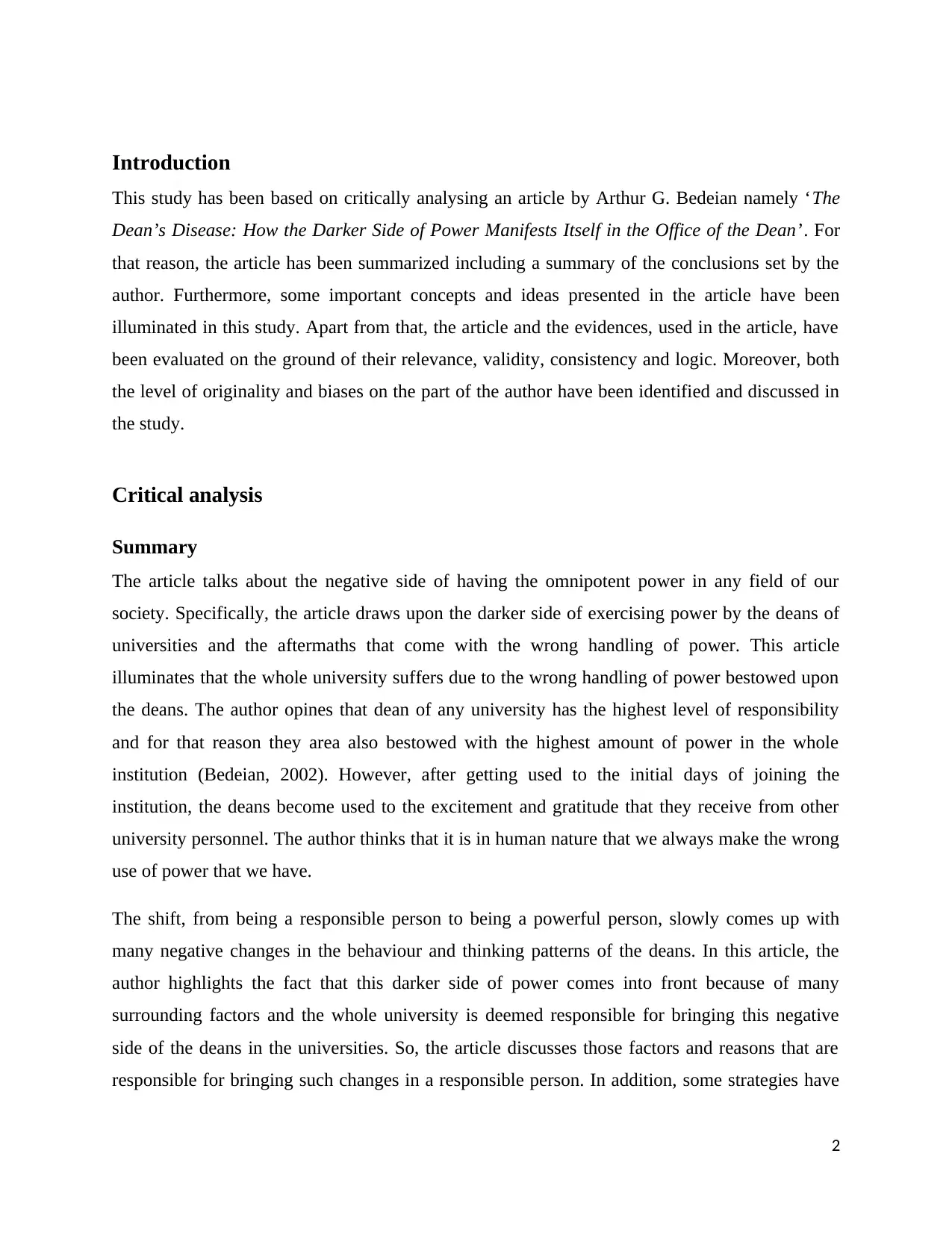
Introduction
This study has been based on critically analysing an article by Arthur G. Bedeian namely ‘The
Dean’s Disease: How the Darker Side of Power Manifests Itself in the Office of the Dean’. For
that reason, the article has been summarized including a summary of the conclusions set by the
author. Furthermore, some important concepts and ideas presented in the article have been
illuminated in this study. Apart from that, the article and the evidences, used in the article, have
been evaluated on the ground of their relevance, validity, consistency and logic. Moreover, both
the level of originality and biases on the part of the author have been identified and discussed in
the study.
Critical analysis
Summary
The article talks about the negative side of having the omnipotent power in any field of our
society. Specifically, the article draws upon the darker side of exercising power by the deans of
universities and the aftermaths that come with the wrong handling of power. This article
illuminates that the whole university suffers due to the wrong handling of power bestowed upon
the deans. The author opines that dean of any university has the highest level of responsibility
and for that reason they area also bestowed with the highest amount of power in the whole
institution (Bedeian, 2002). However, after getting used to the initial days of joining the
institution, the deans become used to the excitement and gratitude that they receive from other
university personnel. The author thinks that it is in human nature that we always make the wrong
use of power that we have.
The shift, from being a responsible person to being a powerful person, slowly comes up with
many negative changes in the behaviour and thinking patterns of the deans. In this article, the
author highlights the fact that this darker side of power comes into front because of many
surrounding factors and the whole university is deemed responsible for bringing this negative
side of the deans in the universities. So, the article discusses those factors and reasons that are
responsible for bringing such changes in a responsible person. In addition, some strategies have
2
This study has been based on critically analysing an article by Arthur G. Bedeian namely ‘The
Dean’s Disease: How the Darker Side of Power Manifests Itself in the Office of the Dean’. For
that reason, the article has been summarized including a summary of the conclusions set by the
author. Furthermore, some important concepts and ideas presented in the article have been
illuminated in this study. Apart from that, the article and the evidences, used in the article, have
been evaluated on the ground of their relevance, validity, consistency and logic. Moreover, both
the level of originality and biases on the part of the author have been identified and discussed in
the study.
Critical analysis
Summary
The article talks about the negative side of having the omnipotent power in any field of our
society. Specifically, the article draws upon the darker side of exercising power by the deans of
universities and the aftermaths that come with the wrong handling of power. This article
illuminates that the whole university suffers due to the wrong handling of power bestowed upon
the deans. The author opines that dean of any university has the highest level of responsibility
and for that reason they area also bestowed with the highest amount of power in the whole
institution (Bedeian, 2002). However, after getting used to the initial days of joining the
institution, the deans become used to the excitement and gratitude that they receive from other
university personnel. The author thinks that it is in human nature that we always make the wrong
use of power that we have.
The shift, from being a responsible person to being a powerful person, slowly comes up with
many negative changes in the behaviour and thinking patterns of the deans. In this article, the
author highlights the fact that this darker side of power comes into front because of many
surrounding factors and the whole university is deemed responsible for bringing this negative
side of the deans in the universities. So, the article discusses those factors and reasons that are
responsible for bringing such changes in a responsible person. In addition, some strategies have
2
⊘ This is a preview!⊘
Do you want full access?
Subscribe today to unlock all pages.

Trusted by 1+ million students worldwide
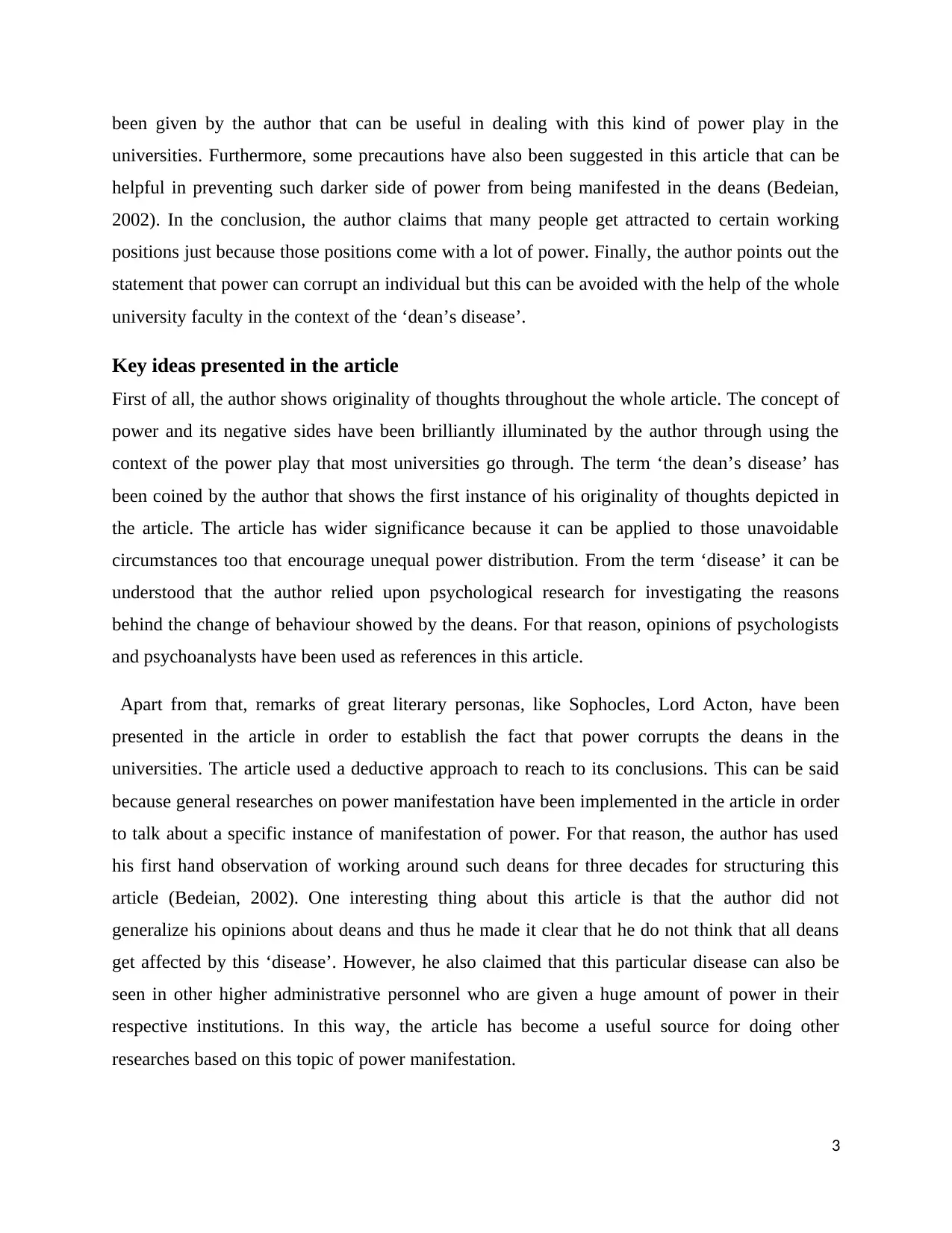
been given by the author that can be useful in dealing with this kind of power play in the
universities. Furthermore, some precautions have also been suggested in this article that can be
helpful in preventing such darker side of power from being manifested in the deans (Bedeian,
2002). In the conclusion, the author claims that many people get attracted to certain working
positions just because those positions come with a lot of power. Finally, the author points out the
statement that power can corrupt an individual but this can be avoided with the help of the whole
university faculty in the context of the ‘dean’s disease’.
Key ideas presented in the article
First of all, the author shows originality of thoughts throughout the whole article. The concept of
power and its negative sides have been brilliantly illuminated by the author through using the
context of the power play that most universities go through. The term ‘the dean’s disease’ has
been coined by the author that shows the first instance of his originality of thoughts depicted in
the article. The article has wider significance because it can be applied to those unavoidable
circumstances too that encourage unequal power distribution. From the term ‘disease’ it can be
understood that the author relied upon psychological research for investigating the reasons
behind the change of behaviour showed by the deans. For that reason, opinions of psychologists
and psychoanalysts have been used as references in this article.
Apart from that, remarks of great literary personas, like Sophocles, Lord Acton, have been
presented in the article in order to establish the fact that power corrupts the deans in the
universities. The article used a deductive approach to reach to its conclusions. This can be said
because general researches on power manifestation have been implemented in the article in order
to talk about a specific instance of manifestation of power. For that reason, the author has used
his first hand observation of working around such deans for three decades for structuring this
article (Bedeian, 2002). One interesting thing about this article is that the author did not
generalize his opinions about deans and thus he made it clear that he do not think that all deans
get affected by this ‘disease’. However, he also claimed that this particular disease can also be
seen in other higher administrative personnel who are given a huge amount of power in their
respective institutions. In this way, the article has become a useful source for doing other
researches based on this topic of power manifestation.
3
universities. Furthermore, some precautions have also been suggested in this article that can be
helpful in preventing such darker side of power from being manifested in the deans (Bedeian,
2002). In the conclusion, the author claims that many people get attracted to certain working
positions just because those positions come with a lot of power. Finally, the author points out the
statement that power can corrupt an individual but this can be avoided with the help of the whole
university faculty in the context of the ‘dean’s disease’.
Key ideas presented in the article
First of all, the author shows originality of thoughts throughout the whole article. The concept of
power and its negative sides have been brilliantly illuminated by the author through using the
context of the power play that most universities go through. The term ‘the dean’s disease’ has
been coined by the author that shows the first instance of his originality of thoughts depicted in
the article. The article has wider significance because it can be applied to those unavoidable
circumstances too that encourage unequal power distribution. From the term ‘disease’ it can be
understood that the author relied upon psychological research for investigating the reasons
behind the change of behaviour showed by the deans. For that reason, opinions of psychologists
and psychoanalysts have been used as references in this article.
Apart from that, remarks of great literary personas, like Sophocles, Lord Acton, have been
presented in the article in order to establish the fact that power corrupts the deans in the
universities. The article used a deductive approach to reach to its conclusions. This can be said
because general researches on power manifestation have been implemented in the article in order
to talk about a specific instance of manifestation of power. For that reason, the author has used
his first hand observation of working around such deans for three decades for structuring this
article (Bedeian, 2002). One interesting thing about this article is that the author did not
generalize his opinions about deans and thus he made it clear that he do not think that all deans
get affected by this ‘disease’. However, he also claimed that this particular disease can also be
seen in other higher administrative personnel who are given a huge amount of power in their
respective institutions. In this way, the article has become a useful source for doing other
researches based on this topic of power manifestation.
3
Paraphrase This Document
Need a fresh take? Get an instant paraphrase of this document with our AI Paraphraser
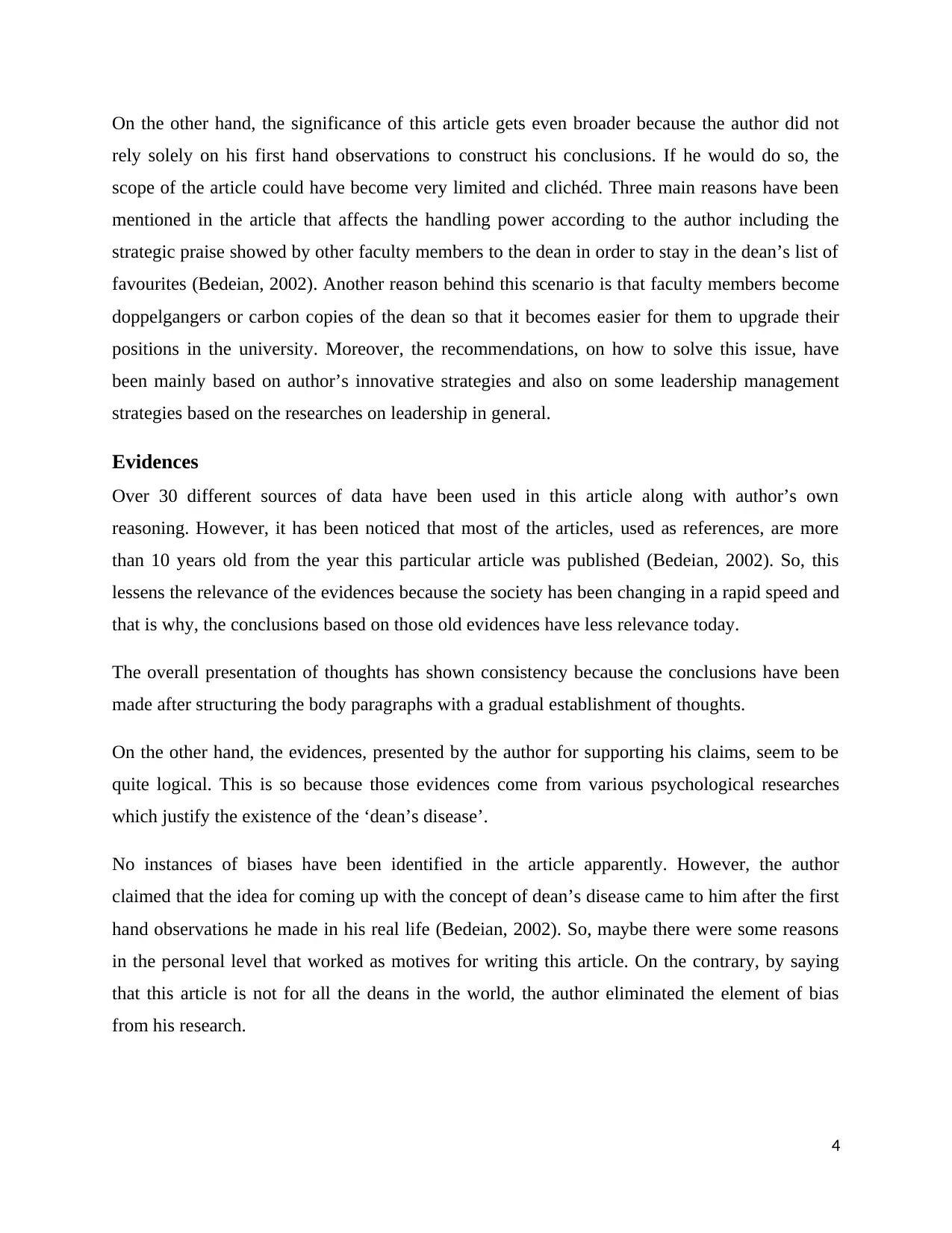
On the other hand, the significance of this article gets even broader because the author did not
rely solely on his first hand observations to construct his conclusions. If he would do so, the
scope of the article could have become very limited and clichéd. Three main reasons have been
mentioned in the article that affects the handling power according to the author including the
strategic praise showed by other faculty members to the dean in order to stay in the dean’s list of
favourites (Bedeian, 2002). Another reason behind this scenario is that faculty members become
doppelgangers or carbon copies of the dean so that it becomes easier for them to upgrade their
positions in the university. Moreover, the recommendations, on how to solve this issue, have
been mainly based on author’s innovative strategies and also on some leadership management
strategies based on the researches on leadership in general.
Evidences
Over 30 different sources of data have been used in this article along with author’s own
reasoning. However, it has been noticed that most of the articles, used as references, are more
than 10 years old from the year this particular article was published (Bedeian, 2002). So, this
lessens the relevance of the evidences because the society has been changing in a rapid speed and
that is why, the conclusions based on those old evidences have less relevance today.
The overall presentation of thoughts has shown consistency because the conclusions have been
made after structuring the body paragraphs with a gradual establishment of thoughts.
On the other hand, the evidences, presented by the author for supporting his claims, seem to be
quite logical. This is so because those evidences come from various psychological researches
which justify the existence of the ‘dean’s disease’.
No instances of biases have been identified in the article apparently. However, the author
claimed that the idea for coming up with the concept of dean’s disease came to him after the first
hand observations he made in his real life (Bedeian, 2002). So, maybe there were some reasons
in the personal level that worked as motives for writing this article. On the contrary, by saying
that this article is not for all the deans in the world, the author eliminated the element of bias
from his research.
4
rely solely on his first hand observations to construct his conclusions. If he would do so, the
scope of the article could have become very limited and clichéd. Three main reasons have been
mentioned in the article that affects the handling power according to the author including the
strategic praise showed by other faculty members to the dean in order to stay in the dean’s list of
favourites (Bedeian, 2002). Another reason behind this scenario is that faculty members become
doppelgangers or carbon copies of the dean so that it becomes easier for them to upgrade their
positions in the university. Moreover, the recommendations, on how to solve this issue, have
been mainly based on author’s innovative strategies and also on some leadership management
strategies based on the researches on leadership in general.
Evidences
Over 30 different sources of data have been used in this article along with author’s own
reasoning. However, it has been noticed that most of the articles, used as references, are more
than 10 years old from the year this particular article was published (Bedeian, 2002). So, this
lessens the relevance of the evidences because the society has been changing in a rapid speed and
that is why, the conclusions based on those old evidences have less relevance today.
The overall presentation of thoughts has shown consistency because the conclusions have been
made after structuring the body paragraphs with a gradual establishment of thoughts.
On the other hand, the evidences, presented by the author for supporting his claims, seem to be
quite logical. This is so because those evidences come from various psychological researches
which justify the existence of the ‘dean’s disease’.
No instances of biases have been identified in the article apparently. However, the author
claimed that the idea for coming up with the concept of dean’s disease came to him after the first
hand observations he made in his real life (Bedeian, 2002). So, maybe there were some reasons
in the personal level that worked as motives for writing this article. On the contrary, by saying
that this article is not for all the deans in the world, the author eliminated the element of bias
from his research.
4
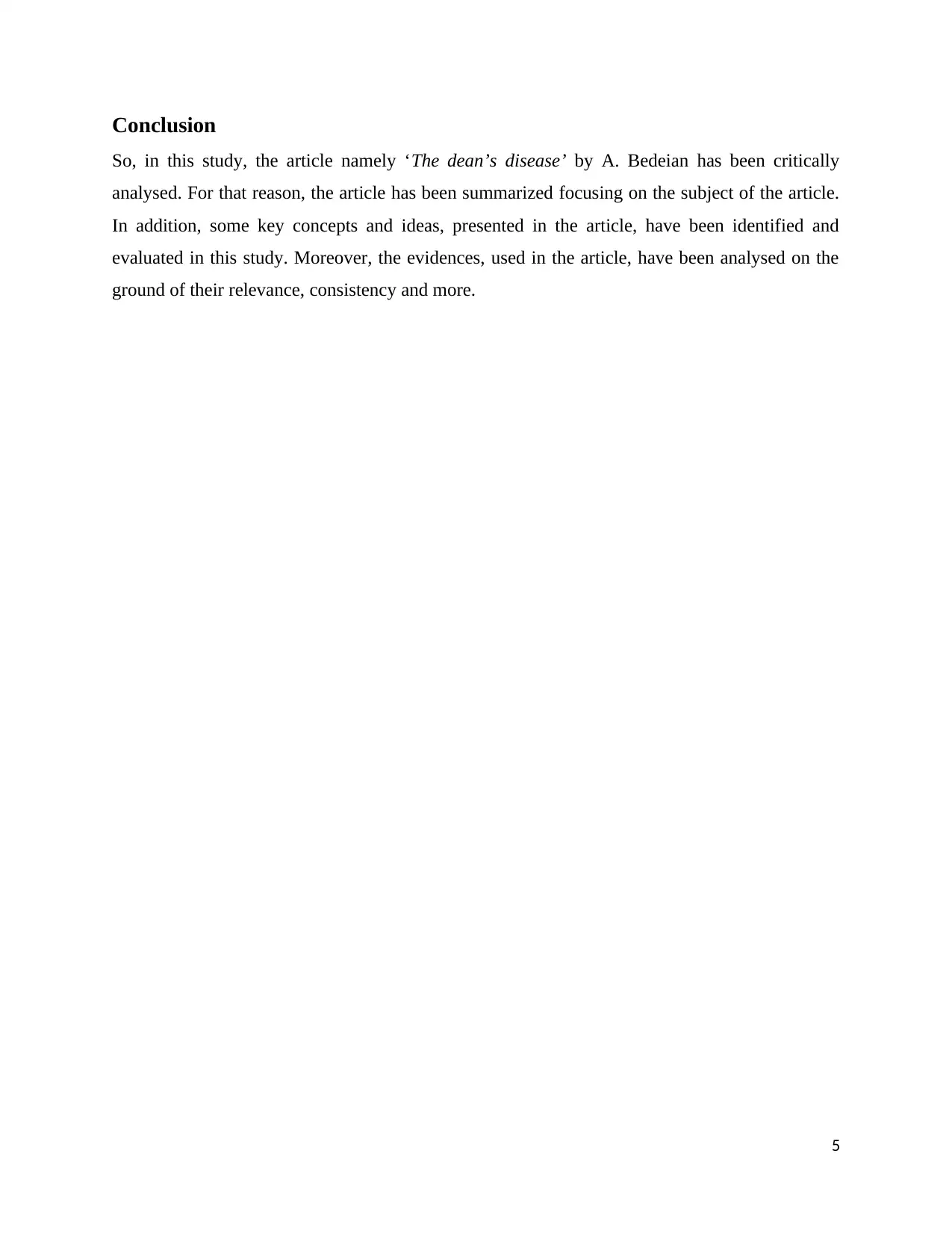
Conclusion
So, in this study, the article namely ‘The dean’s disease’ by A. Bedeian has been critically
analysed. For that reason, the article has been summarized focusing on the subject of the article.
In addition, some key concepts and ideas, presented in the article, have been identified and
evaluated in this study. Moreover, the evidences, used in the article, have been analysed on the
ground of their relevance, consistency and more.
5
So, in this study, the article namely ‘The dean’s disease’ by A. Bedeian has been critically
analysed. For that reason, the article has been summarized focusing on the subject of the article.
In addition, some key concepts and ideas, presented in the article, have been identified and
evaluated in this study. Moreover, the evidences, used in the article, have been analysed on the
ground of their relevance, consistency and more.
5
⊘ This is a preview!⊘
Do you want full access?
Subscribe today to unlock all pages.

Trusted by 1+ million students worldwide
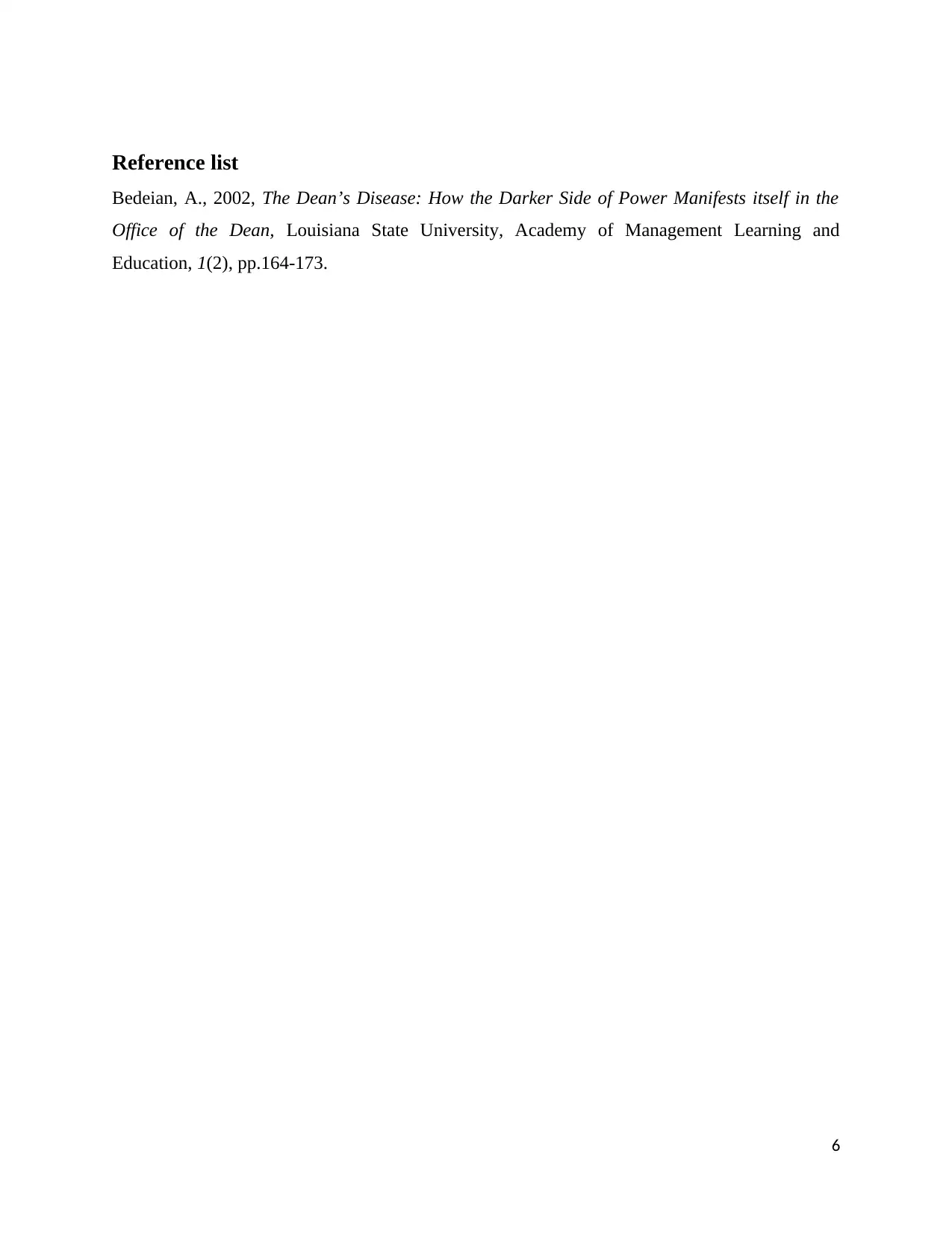
Reference list
Bedeian, A., 2002, The Dean’s Disease: How the Darker Side of Power Manifests itself in the
Office of the Dean, Louisiana State University, Academy of Management Learning and
Education, 1(2), pp.164-173.
6
Bedeian, A., 2002, The Dean’s Disease: How the Darker Side of Power Manifests itself in the
Office of the Dean, Louisiana State University, Academy of Management Learning and
Education, 1(2), pp.164-173.
6
1 out of 7
Related Documents
Your All-in-One AI-Powered Toolkit for Academic Success.
+13062052269
info@desklib.com
Available 24*7 on WhatsApp / Email
![[object Object]](/_next/static/media/star-bottom.7253800d.svg)
Unlock your academic potential
Copyright © 2020–2025 A2Z Services. All Rights Reserved. Developed and managed by ZUCOL.




